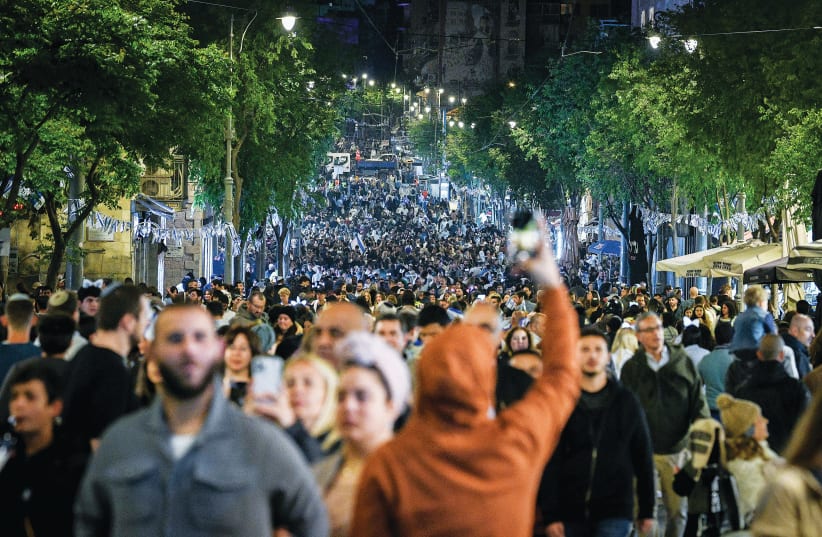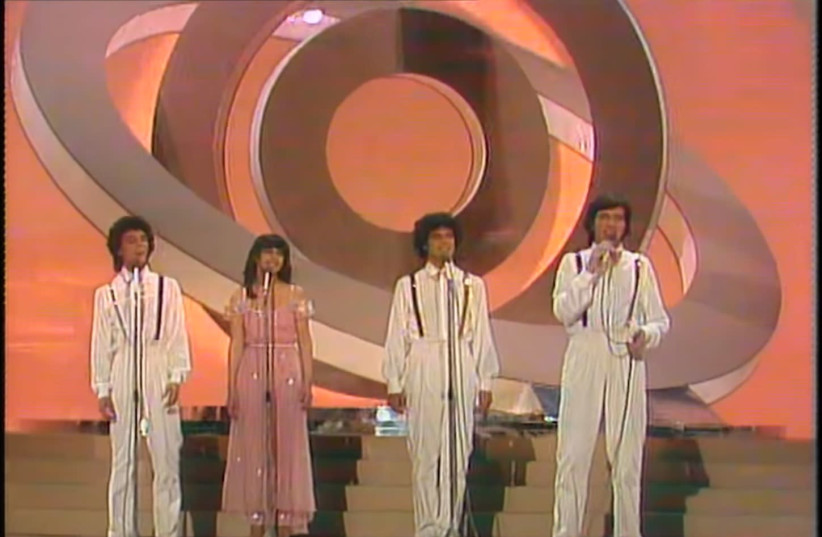Every once in a while, on Independence Day or before Rosh Hashanah, one radio station or another, one newspaper or the next, will rank the most beloved Israeli song of all time.
This year Gali Atari’s 1986 song “Ein Li Eretz Aheret” led the hit parade of the top 75 songs of Israel’s first 75 years, chosen by the listeners of KAN Gimmel and the readers of Israel Hayom and revealed toward the end of Independence Day on Wednesday afternoon.
While music fans can debate whether, indeed, this is the absolute best song Israel has produced over the last 75 years, what is undeniable is that this song captures the current mood of the country.
The times have changed
In 2012, for instance, this song came in at No. 47 on a similar hit parade of the country’s top 100 songs, carried out by a Hebrew cultural website called Megaphone, with that year’s top song being one that came in fourth place this year: Arik Einstein, Korin Allal and Yehudit Ravitz’s classic love song “Atur Mitzhech” (“Your forehead adorned”).
“Ein Li Eretz Aheret”: same song, vastly different rating. Why? Because the times have changed. Because in 2012 the country was not riven by the types of rifts that have cleaved the country this year. Because in 2012 lines from this song were not being used intermittently by different sides in protests roiling the land.
This year both those fervently opposed to judicial overhaul and those pushing for a compromise have evoked different lines from that song. This year that song reflects the feeling of many Israelis as the country enters its 76th year: anger, disappointment and frustration but also an appreciation as well that they “have no other land.”
“I have no other country, even though my land is burning,” goes the song’s opening line.
It continues: “Here is my home. I will not be silent, for my country has changed her face. I shall not give up on her. I will remind her and sing into her ears until she opens her eyes.”
One wonders whether next year, or the year after that, or three, four or five years down the line, when other issues and crises will have superseded the judicial reform debate, this song will remain at the top of the hit parade, or another song will be selected that expresses the national mood at that particular moment.
Independence Day, preceded by Remembrance Day for the Fallen of Israel’s Wars, came this year at a propitious moment amid the passionate debate over judicial reform and the nation’s direction.
Those national days, as well as Holocaust Remembrance Day a week earlier, provided needed perspective about what is at stake. Those national days came as a reminder to the nation, especially those negotiating a compromise regarding the judicial overhaul, of the need to pick its head up from the daily grind and take a wider view.
The security events of the last three weeks – the unending terrorism, the rockets from Lebanon, Syria and Gaza, and the bluster heard from Tehran and Beirut – also put things in a certain perspective and concentrated the mind on the need to find a resolution to the judicial reform issue or face the consequences of Israel’s enemies acting on their perception that Israel is divided, weak and just a step away from the abyss.
The annual IAF Independence Day flyover reminded the nation of the country’s enormous military might and, as it does each year, was a goosebump-inducing reminder of the distance the Jewish people, thanks to Israel, have traveled in the 78 years since the Holocaust.
For years the standing joke has been that if Israel’s enemies would just leave the country alone, the Jews inside it would kill themselves. Events of recent weeks show that the country’s enemies can’t leave the state alone, and the current national days of commemoration provide an injection of unity helping to ensure that Jews dwelling in Zion won’t kill themselves.
Israeli heroism and pride
FOR 48 HOURS that started Monday night and extended until the end of the Israel Prize ceremony on Wednesday evening, the media was full of stories of Israeli heroism and pride, rather than talk of the demise of the state and its democracy. For a brief period “I am proud to be an Israeli” were the words heard on television, rather than “I am ashamed of where the country is going and considering leaving it.”
Fears that the secular sanctity of the days would be desecrated by unseemly protests at cemeteries on Remembrance Day and at the annual torch-lighting ceremony or other Independence Day events were largely unfulfilled. True, there were a few incidents, but they were relatively minor. The vast majority of ceremonies and events came and went without incident.
For the most part, Israel’s 75th Independence Day – though much more low-key than what one might have expected from a jubilee anniversary – felt like any other Independence Day.
Then it ended, and reality came crashing back in.
“The Knesset returns from the recess in a storm,” read the overline to Yediot Aharonot’s lead headline on Thursday morning, screaming that inside the Likud there is concern that the “judicial legislation will remain frozen.” Maariv’s headline was more to the point: “Going back to the reform.”
In other words, the country had a break from the storm for a couple of days, but now the storm is heading our way again.
The storm returned Thursday night in the form of the massive demonstration in Jerusalem in favor of judicial reform, a demonstration aimed more at sending a signal to Prime Minister Benjamin Netanyahu than as a counterweight to the huge demonstrations staged week after week by anti-judicial reform forces. Thursday night’s protests were a message to Netanyahu from his base not to abandon the reform.
The storm is sure to pick up more velocity on Saturday night when the anti-reform forces promise to be back in full force for their weekly protests. And then on Monday the Knesset will return from its Passover recess for its summer session, which promises to be as tumultuous as the spring session.
But this storm is likely to be different. If in its last session the Knesset was torn over the judicial overhaul that furiously pitted the opposition against the coalition, the new storm brewing inside the Knesset is likely to have its eye inside the coalition itself.
The judicial overhaul issue has still not been resolved. Far from it. But the negotiations are continuing; and as they continue, there is little expectation that legislation that began in the last session – such as changing how the Supreme Court judges are selected – will move forward. One reason: the coalition’s main priority now will be passing the state budget, something it will need to do by May 29 or face new elections.
This will be no cakewalk. Netanyahu’s haredi coalition partners are demanding that the government pass an updated haredi conscription law before the budget deadline, something that will generate considerable opposition. Defense Minister Yoav Gallant’s proposal would lower the age of exemptions for haredim from the army from 26 to 23 or 21, and in parallel increase the financial incentives for those soldiers in combat units.
If passed, this bill will surely come before the High Court of Justice, which in the past has shot down frameworks aimed at enshrining haredi conscription/exemption arrangements into law on the grounds that they are unequal and give haredim preferential treatment.
This bill will also surely add fire to the anti-judicial reforms protests, which in any event have been fueled in part by anger that haredi parties – as integral parts of the government – are fundamentally rejiggering the way the country is run, even though haredim do not, for the most part, serve in the army.
All of that will surely and quickly erase from memory the relative political peace and quiet of the last few days. Or, as they say in the army, every Shabbat – a day when many soldiers have off – has a motza’ei Shabbat, a night after Shabbat, when the soldiers return to their bases and the dreary reality of daily army life begins anew.
The nation’s collective Remembrance Day/Independence Shabbat has ended. Motza’ei Shabbat is now upon us.

